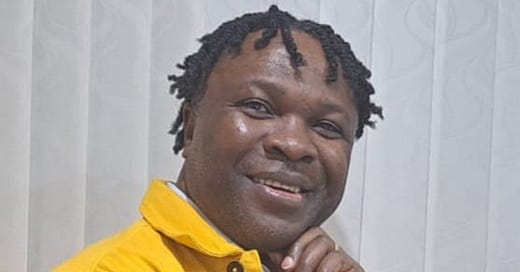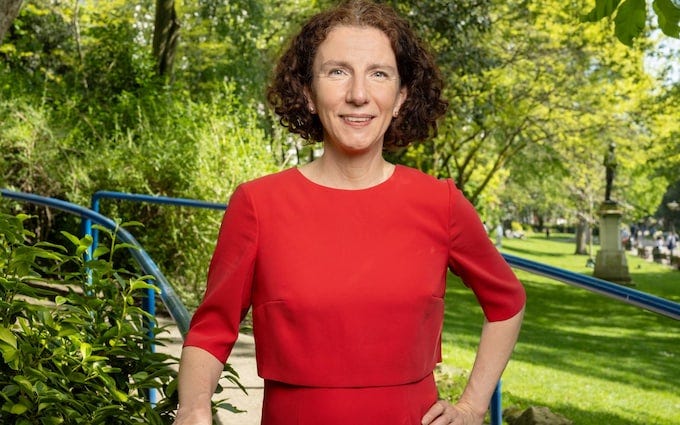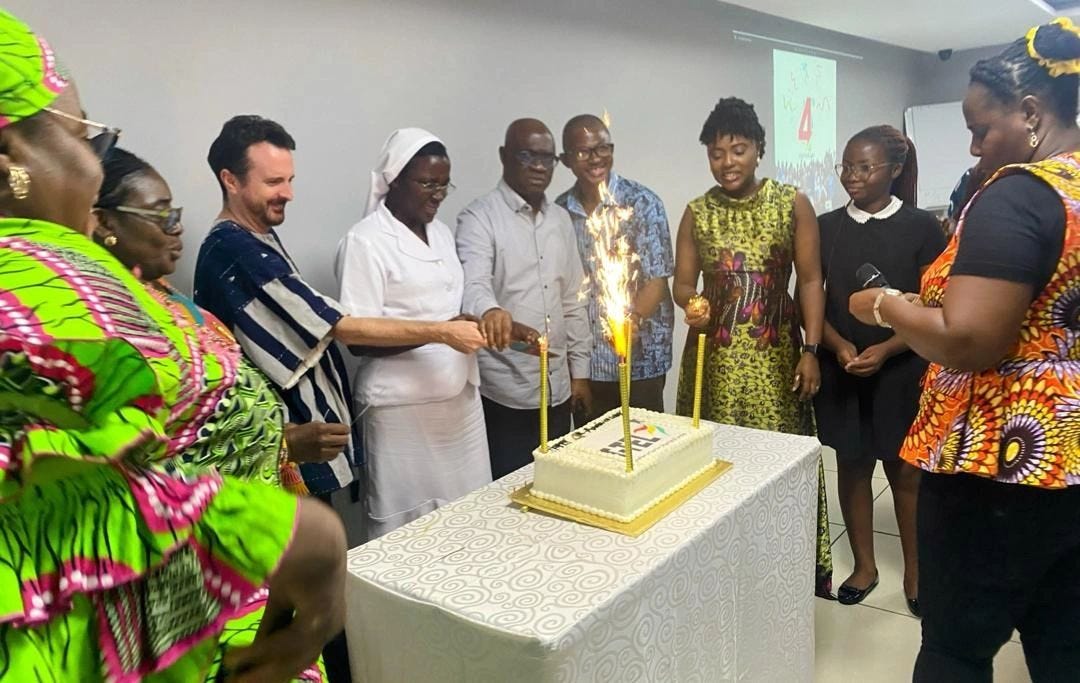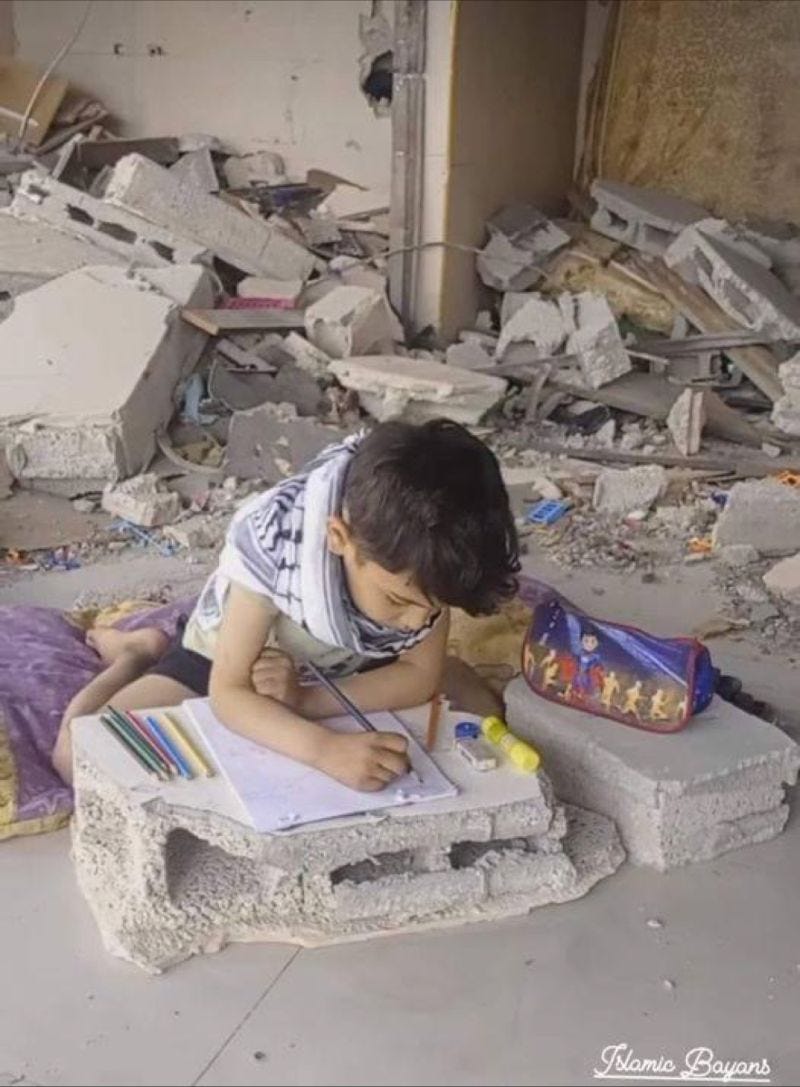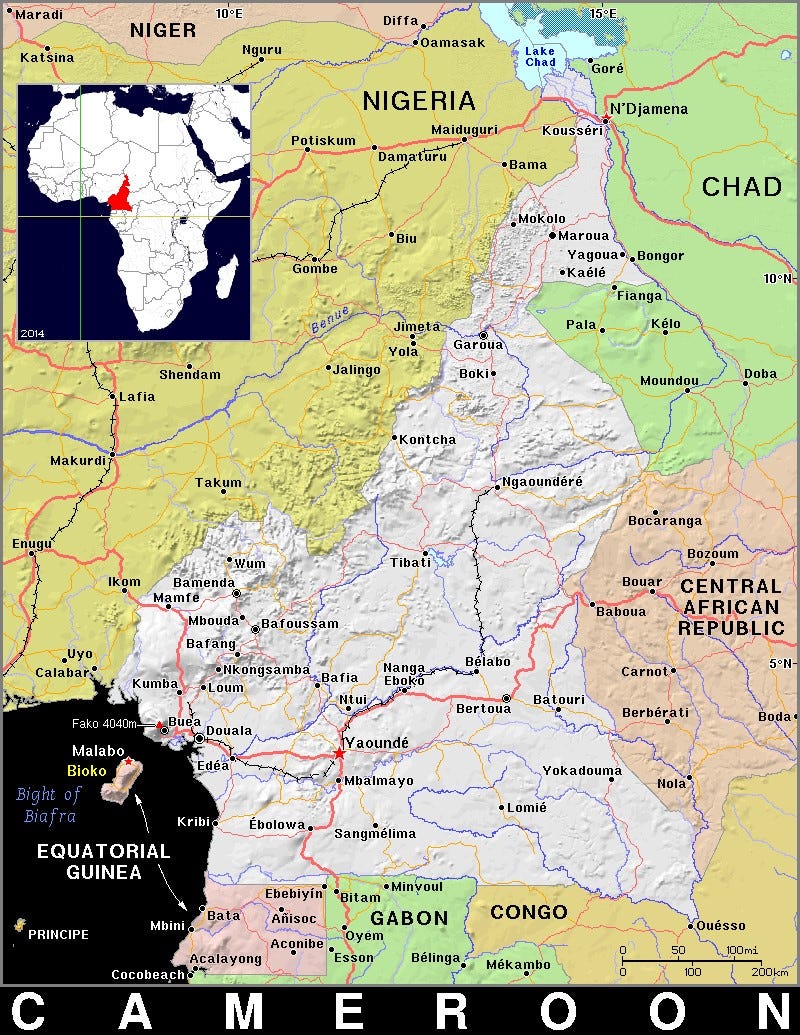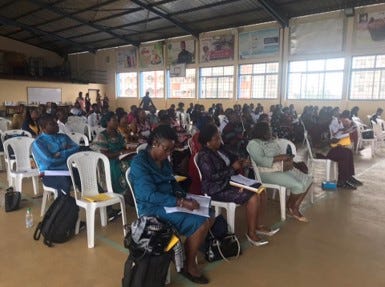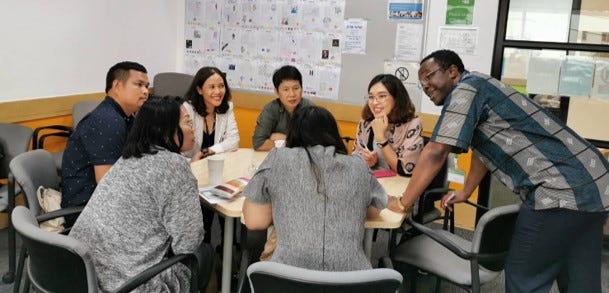Re Education : Issue #9 - Challenging Colonial Mindsets
A newsletter about international education development
(If this message does not format properly in your email - please click the “Read in App” above, top right).
Introduction
This month’s feature is an interview with Dr. Harry Kuchah Kuchah, Associate Professor of Languages, Social Justice and Education at the University of Birmingham. He’s a Cameroonian educator with an impressive variety of careers : teacher, inspector, ministerial adviser, consultant and, latterly, an academic in several British universities. Those varied roles have allowed him to view the Cameroonian education system from all angles, leading to some unique insights on teaching, policy making, practical change and research.
But, his observations are not just about Cameroon and his reflections on decolonisation and decoloniality could apply equally to other countries. He’s critical of the continued imbalance in power relations between the North and the South, but equally critical of some southern educators who he says too readily import northern dominated ideas on the structures and values of education systems, such as the continued preference for English as a medium of instruction over local languages.
“We know the economic strength has been in the North for a long time due to the geopolitical landscape. We need to acknowledge that. But as African and African diaspora academics, we need to find ways to deal with that. This is a central issue that needs to be addressed.”
Andy Brock, July 2024
Subscribe for free and receive each issue of Re Education automatically to your inbox.
“It takes 20 years to build a reputation and five minutes to ruin it.”
Warren Buffet
News
In the UK, the election of a new Labour government has created a sense of cautious excitement around international development after the casual destruction initiated by Boris Johnson.
Labour has committed to rebuild the UK’s development reputation, but it is well known that they are inheriting a stagnant economy and a crisis in public services. Anneliese Dodds has been appointed to the role of Minister of State for Development (the role Andrew Mitchell held before). International development professionals are eagerly watching for signs of direction. Spending on aid in these circumstances attracts more scrutiny and criticism than usual, but is also an opportunity to set out values.
A couple of interesting takes on where the FCDO should focus in order to regain its international standing in development are by Moazzam Malik ex-DG Africa for FCDO and Ian Mitchell of the Centre for Global Development. Notable that neither see education development as a high priority (except as subsumed in “girls”) and Malik advocates for much greater spending on multilaterals, which may make sense on global issues (Climate change, AI, Environment etc.) but seems to ignore the expertise that British development professionals and academics provide - a very large part of the UK’s reputation in this area. See also the comments on Malik’s piece for challenges to abandoning a values-based approach to development.
Parthajeet Das has published the third in his three-parter on scaling in education. I strongly recommend reading all three. Parthajeet takes a very grounded and practical approach with many references to real-life cases and dilemmas. This is a real practitioners’ take on the issue.
Looking for opportunities in Education, EdTech, Evidence, Migration and Philanthropy ? Nora Marketos publishes a really helpful list of jobs / roles in these areas called EdPhil. Check it out, free subscription.
Richard Ingram is an inclusive education specialist and host of a podcast called Goal4Education. He interviews luminaries of the education world who focus mainly on education issues in the global south. A recent experimental episode set up a debate between myself (status : non-luminary) and Pauline Essah of Education Sub-Saharan Africa (ESSA) called Evidence Building in Education in which we debated whether education research is too well funded. It was fun to do it, hope it’s interesting to listen to. Do follow the link above and look up some of his other podcast interviews.
Development
Kat Patillo has published an excellent list of 16 southern educators in her well-regarded Substack, Edwell. It really is an impressive piece of work, both inspirational and revealing. I’m ashamed to say I think I recognised fewer than 30% of the people listed. See below for just one example, Funmilayo Ransome-Kuti of Nigeria.
Interesting post (and comments) by Nik Kafka of Teach a Man to Fish (wish that name was made a bit more inclusive) on the difficulties of persuading donors to think outside the box in approaches to engaging children in numeracy education and entrepreneurship.
Voices from the front
T-Tel was a FCDO funded programme started in 2014 to help reform the way pre-service training was undertaken in Ghana. Cambridge Education (my old alma mater) implemented the programme for DFID and, about halfway through, Robin Todd was appointed Team Leader. Robin and Chief Technical Adviser Akwasi Addae-Bohene, together with a very capable team, worked hand-in-hand with the Ministry of Education and all the major universities in Ghana to produce a substantially reformed pre-service teacher training process. Sounds simple but it was a triumph of negotiation, diplomacy and challenging vested interests.
Even more interesting than this success though, is how the T-Tel team, with funding from Mastercard and support from Cambridge Education, transitioned from a private sector led project team to a local NGO. Robin was so committed to this change he left Cambridge Education to lead the new T-Tel. Now celebrating it’s fourth birthday the team has grown, is stronger, and is a great example of sustainable local organisation dedicated to improving education in Ghana.
Voices from the rear
(Gray and Published Research)
Professor Angela Little, doyenne of education in Sri Lanka, has just written what will likely become the definitive book on education in Sri Lanka : “Development, Education and Learning in Sri Lanka : An International Journey”. It covers her and others’ research over a 50-year period. I will include a review in a future newsletter – but in the meantime you can download it for free by clicking the link above.
Hot off the press – Mission Driven Bureaucrats by Dan Honig. Timely with new Labour government emphasising non-doctrinal approaches to growth and the focus on scale and problem solving. But, this book focuses on making change happen in the global south. His earlier 2018 book Navigating by Judgement is also an interesting read for development nerds.
Sam Freedman, who used to be CEO at Education Partnerships (part of ARK), has, in recent years, become a highly respected political commentator, with the third largest politics Substack in the UK. He has just published a new book called “Failed State”. Before his stint in international development Sam worked in the Department for Education and was Chief Exec of Teach First : he’s a shrewd and funny observer of UK politics. This is sure to be a very insightful read. Perhaps there will be roles for some of those who have specialised in other “failed states” in the development sphere !
If you want some summer reading, The Economist features a focus on education in it’s current July13th-19th issue. Although mainly examining OECD countries, many of the issues face countries in the global south too. It’s notable that learning outcomes (in PISA tests) are declining in many once-celebrated countries, like Finland.
Feature Interview
Harry Kuchah : Challenging Colonial Mindsets
Formative Experiences
Being assigned to work in Kaele, northern Cameroon at a teacher training college with 5 female and 300 male teacher trainees was Harry Kuchah Kuchah’s introduction to the challenges of rural education.
Cameroon allows direct entry into teacher training for primary school educators and Harry was selected to train as an English language teacher trainer after graduating from University of Yaoundé and gaining a Post Graduate Degree.
In the last three years of his seven-year posting, he had the opportunity to work in a secondary school teaching English. His classes were huge – one was 232 pupils crammed into a room designed for 80. Determined not to resort to rote learning, but to apply some of the more participative methods he used with teachers, he struggled with a variety of approaches until he decided to share his dilemma with his students in a process he later termed a “pedagogy of autonomy” in contrast to the better known “pedagogy for autonomy.”
They responded with energy by suggesting being taught outdoors, proposing a group approach with student leaders to lead learning and bringing and designing their own learning materials. His 2002 article “Pedagogy of Autonomy for difficult circumstances : From practice to principles”, jointly authored with Richard Smith, starts with a detailed description of this personal psychological and pedagogical journey, before setting it in a theoretical frame. It’s a very trenchant, honest and entertaining read – and a good example of practice to theory.
The system which tolerated overcrowded classes also often stifled creative attempts to change it. In another defining experience, Harry personally travelled to a remote village to persuade one of his pupils who had dropped out to give education a second chance. This student had loved Harry’s more progressive play and activity-based teaching approach, and English was his favourite subject. But, the examinations were based on grammar, vocabulary and essay writing – which the student failed badly. Harry was successful in persuading him to give up cowherding and return to school, but, it taught him a sobering lesson and impacted his philosophy of learning. “As educators” he says “we must recognise the potential in every student, even when the system fails to recognise it”.
Seeing Behind the Curtain
Harry returned to Yaoundé and was appointed as a National Inspector, at the same time becoming Secretary General and Chief Convener of the Cameroon English Language and Literature Teachers Association. Even now he kept his feet firmly in the classroom, negotiating to spend every Thursday in a school in his National Inspector role – allowing him to continue to see how policy really played out or was interpreted at the classroom level. He reflects that : “I wanted to gain insights into the thinking behind the practices of teachers and children. I worked a lot with 11-year-olds and wanted to understand how they perceived teaching practices and what good practice meant to them. This was often significantly different from many of the things that policy was imposing on teachers.”
As Harry continued to struggle with this policy-practice cognitive dissonance he was offered an insight into the very heart of the system. He was asked to to join the Minister of Education’s team of personnel with a particular role to help defend the national budget in parliament. He helped prepare the pedagogic documentation to be presented to Parliament and sat behind the Minister as she made her presentation. As questions were asked Harry and other colleagues had to quickly scribble answers and pass them through the Permanent Secretary to the Minister while she talked. To his surprise, Harry noted, “There were significant differences between the answers I thought I had given and what the Minister eventually said”.
Later, the Minister gently chided Harry : “My son. There are things you don’t say in Parliament - I hope you understand ?” For example, Harry had written in response to a question “we could not do this because….” but the Minister had said “we tried to do this but…,”. Harry’s reflection was “It’s not acknowledging that we didn’t do something. It’s showing that we tried to do it. All these things made me see the bigger picture. But, it also showed me the deep-rooted, colonial influences on policy making in my country.”
The Colonial Influence
Those deep-rooted influences continue to appear. On two occasions, Harry challenged the depth of understanding visiting experts had of the country. The reaction was : “I was told by the boss above my boss, “Who are you to speak when an expert is speaking?” That worried me a lot because expertise in this example was defined by whiteness rather than by knowledge. These were external experts from Canada and England who were considered experts in a way that we, who were very educated and knowledgeable about the context and content, were not. These are remnants of colonial mindsets. The more powerful the agenda, the more seriously it is taken, especially if it was funded by people with a lot of money.”
That was some time ago, does he think he would find the same attitudes now ?
“Yes” he says “I think it’s still going on, and not just in Cameroon”. He continues “It’s not always the case that it’s the more powerful bringing an idea and donating that idea with a lot of money, at least in my field of language education. It’s also the case that it’s the local authorities actually developing ideas and advocating for support even when they know that they don’t have the capacity to take that on”.
He cites the case of Côte d’Ivoire and Guinea, both of whom wanted to implement English language education at Primary School. He said he could not find any evidence this would be beneficial. In Côte d’Ivoire, for example, the language of instruction is French, but 87% of the children who go into primary school do not have basic literacy to survive education even in French. A significant percentage drops out of school before they reach the end of primary school. Of those who go into secondary school, about 67% do not have the basic literacy in French to survive education in French.
The Purpose of English ?
So, he recommended against adopting this policy. But, he says, “This is where the power of the Anglophone West is being perceived and, consequently, the English language is being perceived as a gateway to economic empowerment. But, you cannot gain economic empowerment with English alone if you do not have basic skills”.
For example, when he visited schools that were positive about introducing English, he asked them to imagine redesigning their timetable to accommodate English. Invariably, they proposed to do this by reducing the time spent teaching science and for remedial work.
“So, we’re taking away science and support for students who are lagging behind. We’re aiming to produce people who speak very good English but have no scientific knowledge. Is that right?”
He continues : “So, what’s happening is that, on the one hand, we have a colonial mindset that believes everything that comes from the powerful West, especially the Anglophone West, is right. It’s good for us. It’s expected given our differences. On the other hand, we have people from the powerful West who are interested in exploring, in business, in exploiting the resources in this part of the world, using English as a tool of friendship and economic exploitation.”
Power in the Balance
Harry sees this also in the area he is now most active in – academia.
“I’m also very aware of the power external funders have on policy. For us, the African diaspora academia, who have access to funding, we have a responsibility to collaborate with our colleagues on the continent, not just academics, but also practitioners.
For example, I conduct much of my research in Africa and in the global south. I’m currently working on a research project examining gender in classrooms in India and Uganda, funded by the British Council ELTRA scheme. Within this we’ve included a teacher research mentoring program. This empowers these teachers to become generators of local knowledge in their local context, which they can share with other teachers within their context.
While academic research is undoubtedly important, its influence on policy and practice can vary widely. Apart from South Africa, where I have seen Ministers citing and using research, in many other African countries I’ve visited, academic research, especially local research, is often overlooked. High-level policy decisions are frequently influenced by foreign research, if they referred to research at all. This suggests a reliance on external knowledge and perhaps a lack of recognition or utilisation of local academic expertise”.
He pauses for a moment to reflect, then says :
“We know the economic strength has been in the North for a long time due to the geopolitical landscape. We need to acknowledge that. But as African and African diaspora academics, we need to find ways to deal with that. This is a central issue that needs to be addressed.”
…and finally
Isn’t that true ? !
If you know someone who would be interested in reading this newsletter, please pass on, by clicking the share button below. Subscription is free - subscribers receive each issue of Re Education automatically.

